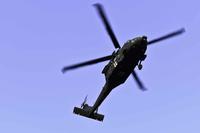Japan’s efforts to re-arm in response to escalating threats from China and North Korea are well-known. Less understood are controversial efforts by some in Japan’s ruling Liberal Democratic Party (LDP) to reestablish world class intelligence and counterespionage capabilities.
Not everyone is on board.
“There has been a group interested in getting intelligence right for decades,” says MIT’s Richard Samuels, author of Special Duty: A History of the Japanese Intelligence Community. “They’ve tried a lot of engineering and reengineering but have encountered much institutional inertia.”
Successful reforms in the 1990s and 2000s focused on consolidating and coordinating military intelligence, Samuels told SpyTalk. In 1997 the Japanese government created the Defense Intelligence Headquarters, modeled on the U.S. Defense Intelligence Agency, to consolidate signals and imagery intelligence operations against potential adversaries. These technical collection efforts expanded between the mid-2000s and mid-2010s as tension mounted across East Asia, and as Japan sent more personnel abroad for UN peacekeeping assignments.
But this was the easy part. For historical reasons, spying operations of any sort, particularly domestic counterespionage work aimed at squelching foreign espionage networks on Japanese soil, were much more sensitive topics.
Ghosts in the Woodwork
Tokyo’s dark record from World War Two was always a consideration. In the 1930s and ‘40s, Japan had famously infiltrated agents across Asia in advance of their conquering forces. During wartime, anti-spying paranoia against everything foreign at home, even against people who simply spoke a foreign language in the closing years of the war, created an escalating climate of fear. It was a legacy that post-war Japanese voters were loath to see revised, fearing a return to militarism, neighborhood informants, and other mass spying against the population.
Under the late Prime Minister Shinzo Abe, Japan made significant progress in reforming foreign intelligence collection and slowly expanded HUMINT (human intelligence gathering) abroad. But domestic “counterintelligence,” said Samuels, “was a sort of stepchild to a lot of these reforms.”
For this reason, since the 1950s counterespionage investigations have been conducted not by a powerful agency, such as the FBI or Britain’s MI-5, but by the Tokyo Metropolitan Police. Its Public Security Bureau (PSB) can be effective but lacks sufficient manpower, according to a former senior Japanese intelligence official interviewed in Tokyo by SpyTalk, asking for anonymity in exchange for talking freely about such sensitive matters.
The PSB does have federal input. It cooperates with a counterintelligence unit under the Justice Ministry, the similarly named Public Security Intelligence Agency. The PSIA labors under a cloud, however, which may have diminished its power. It was blamed for insufficient attention to the Aum Shinrikyo doomsday cult after its 1994 sarin gas attack on the Matsumoto subway system, which was followed by the cult’s even more deadly strike on the Tokyo subway the following year. In a decades-long mea culpa of sorts, PSIA devotes considerable attention to the remaining cult members in Japan.
Though further efforts to consolidate and strengthen Japan’s intelligence and counterintelligence organizations might seem logical in Washington, such plans face significant opposition from those government institutions, politicians, and parts of the business community that support closer relations with Beijing.
Perception Gap
Those opposed to strengthening intelligence perceive China as rising and America in decline, according to the former senior Japanese intelligence official. A pro-China coalition inside the ruling Liberal Democratic Party, the Japan-China Friendship Association, is headed by Toshihiro Nikai, who works closely with the pacifist Komeito “clean government” party to cultivate good relations with Beijing, another former official told SpyTalk.
On the commercial side, a brisk trade relationship with China has been promoted by such governmental institutions as the Japan Science and Technology Agency and the Japan International Cooperation Agency, which has an office in Beijing to arrange tech transfers. Their activities and those of like-minded organizations are described in detail in a study by William Hannas and Huei Mee Chang in the 2021 book China’s Quest for Foreign Technology. They write that “many (overt technology) transfer techniques fielded by China” in other parts of the world “were pioneered by Japan in the post-war era.”
These political and economic interests oppose improvements in Japan’s counterintelligence efforts, citing privacy concerns and fears of a return to the era of imperialist military rule, both former officials said. A former advisor to the late Shinzo Abe told SpyTalk that many voters seem caught between fear of China and fear of a return to militarism.
MIT’s Samuels sees this debate in part as a longtime struggle among Japan’s elites to fine tune Tokyo’s relationship with Washington and Beijing and deal with the legacy of imperialism. Their watchword: “Keep the Americans close enough, but not so close that it antagonizes China.”
Autonomous Defense
Three main points of view contend for dominance in Japan’s raucous political sphere: accommodation with Beijing, a full and unambiguous alliance with Washington, or a more independent policy dubbed “autonomous defense.” The late Yasuhiro Nakasone, prime minister in the mid-1980s, advocated such an independent stance, as did the two-term Abe, who was assassinated last July. As Samuels and others argue, Abe was the most effective advocate of rebuilding Japan’s intelligence and counterintelligence agencies. Perhaps not coincidentally, Abe demonstrated less concern than his contemporaries about Beijing’s sensitivities, whether they were over military and intelligence reforms or his visits to the controversial Yasukuni Shrine, which memorializes Japanese war dead, including war criminals from World War Two, a fact that rankles Japan’s relations with China and both Koreas.
Abe is gone, but his former advisors remain on the scene. In a 2022 book published in Japanese, Facing Up to China, the Odd Superpower, Shigeru Kitamura, the former secretary-general of the National Security Secretariat under Abe, described lax technology controls and espionage cases in past decades that benefitted Russian, North Korean, and Chinese military programs. Wielding in-depth case histories, Kitamura advocates more effective export controls and counterespionage work.
In particular, Kitamura argued in his book that continued close and less than restricted economic relations with China are against Japan’s long term security interests, given Beijing’s increasingly aggressive policies vis-a-vis its neighbors and trade partners, Tokyo in particular.
But not everyone is convinced. Samuels, who also authored an essay on the reinvention of Japan’s intelligence community in The Handbook of Asian Intelligence Cultures, published in 2022, relates a conversation with a retiring Japanese business leader. Centuries ago, he said, the Dutch were one of the world’s greatest powers, and Japan learned from them. Then came the British. Then the Americans. Now, he concluded, Japan should not walk away from China, the future great power.
The task for Washington now is to persuade not only Japanese elites, but the country’s voters, of American resolve, reliability, and support. That makes for a prickly challenge.
Matthew Brazil, a former US government officer in Beijing, is co-author of the authoritative, Chinese Communist Espionage, An Intelligence Primer.











